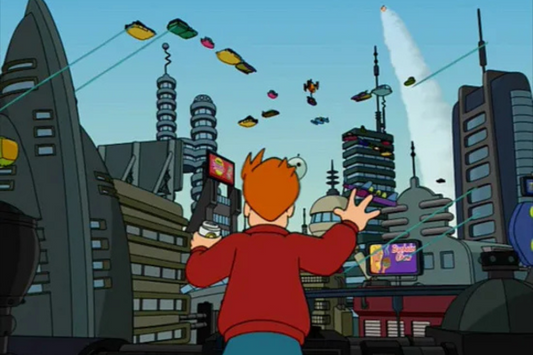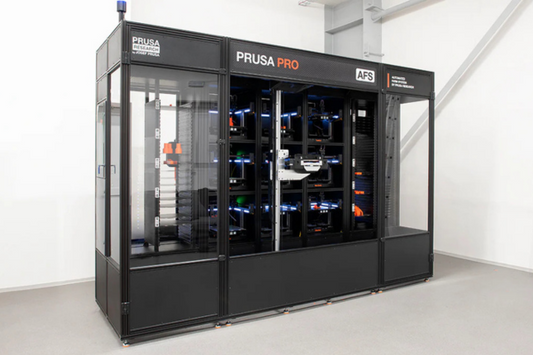From Scarcity to Abundance: Rethinking Economics in the Age of AI

Imagine a world where food grows itself, homes print themselves, and work becomes optional. For centuries, economics has been about rationing scarce resources —> divvying up the pie when there’s never enough to go around.
"Economics is the study of how societies manage their scarce resources."
These words will be familiar to any first year economics student, but what if artificial intelligence turns that pie into an all-you-can-eat buffet? I’m a market-loving economist, but AI’s forcing me to question everything I thought I knew about how the world works...
The Final Evolution of Work
Human labour has historically been divided into two categories: thinking and doing.
The industrial revolution conquered "doing," with machines taking over much of our purely physical workload. So many humans then retreated into "thinking" work where our brains could be put to good use.
However, as you'll be well aware by now, AI is starting to pose a significant threat to the usefulness of humans in knowledge based work too.
Yes, yes, I know. AI often completely sucks right now.
But it's plain as day to me that it won't be long before it doesn't suck. It won't be long before it's far, far better at most tasks than we are. It wont make as many mistakes as we do. It won't need breaks, sleep or holidays. You'll be able to hire as many AI agents as you need and fire them then next day if you choose so.
No matter, we'll just go back to physical tasks right?
Well probably not. The convergence of AI-enabled robotics represents the final frontier: machines that can both think and do.
When machines can both conceive and execute, what economic role remains for human labour?
The Jevons Paradox applied to AI

Historically, technological improvements exhibit some pretty counterintuitive effects when it comes to supply and demand.
You would think that buying a more efficient car would mean we can save money by driving the same distance whilst spending less on fuel. But, we humans don't work like that. We know we spend $x per month on fuel, and the more efficient cars just mean we can drive further!
Websites are another example. In the 90s, building a website required hand-coding in HTML so they were rare and expensive. Then along came platforms like WordPress and Shopify which made them much easier to produce en-masse. But rather than eliminating web development jobs, the demand for websites increased exponentially. Soon everyone had a website (sometimes multiple) and the functionality we expect as standard greatly increased (e.g e-commerce websites).
This is Jevons Paradox in action. But how will this play out as AI becomes ubiquitous?
I believe that this is the most under discussed aspect in AI right now. Everyone is worried about loosing their job. But far fewer people are talking about the monumental increase in demand AI is likely to cause in all the goods and services we desire.
Here comes the "awkward dip"...
Given the above, we essentially have two conflicting concepts quickly approaching each other here. On the one hand, AI is taking our jobs. On the other, AI might make consuming goods and services so cheap that we don't need money to purchase them anyway... 🤔
If you haven't seen it, it's probably time you watched this:
It's crazy to think that CGP Grey's "Humans Need Not Apply" video is over 10 years old now. He was well ahead of the times. But the reason this is relevant is that there may be an awkward "dip" before we end up looking like this:

This "dip" exists at the point where technology hasn't completely eradicated scarcity and there are still goods and services that we need to buy. BUT. At this point, most humans are no longer able to provide meaningfully value to an economy in the form of work, be it physical or knowledge based work, because AI and robotics have now got this covered.

Sorry, Universal Basic Income Ain't Gonna Cut It.
The traditional response to technological unemployment is Universal Basic Income. But this solution still operates within a scarcity framework, giving people money to compete for limited resources. If there's one thing we know about government handouts, all it does is create inflation (Covid)(First home buyers grants).
Instead, if we're going to mandate anything, then it needs to be the creation of genuine abundance.
To update an old proverb:
Instead of giving a man a fish, or even teaching a man to fish, create an army of fishing robots and nobody will ever have to fish again.
Rather than making housing and food "free" through government provision of UBI, we should mandate that a portion of our economic output goes toward developing technologies that make these goods as abundant as air. It's clear to me that the combination of AI and robotics could dramatically reduce the price of food/water, the cost of housing construction and the availability of medicine.
Note that I said housing "construction" there. Land presents more a more complex set of challenges. While we can automate construction and reduce building costs, land itself remains intrinsically scarce. This brings us to a crucial distinction between reproducible goods (like food) and positional goods (like beachfront property).
The Core Input Constraints
Whilst it's easy to imagine that one day AI and robotics could handle the vast majority of both the physical and knowledge based work we currently do, it does start to get a bit sci-fi when you take a reductionist approach and you're left with core inputs to the economy.
- Land
- Energy
- Raw materials
You could make an argument that a sufficiently advanced civilization could one day make even these abundant with the use of nuclear fusion, terra-forming, multi-planetary expansion and molecular assembly, but we might save that for another day. 🤓
So err... what will we even do all day?
Purpose in an Age of Abundance
Lets assume we achieve the technological utopia and nobody wants for anything.
What next?
In a world where the need to work has been completely eliminated, we'll need to address fundamental questions about purpose, status, and meaning. Traditional work will no longer defines human value. History shows that humans without purpose or status hierarchies often create problems just to solve them, or manufacture scarcity just to maintain familiar social structures. And that, doesn't sound good.
Well, to this day we engage in activities that have nothing to do with work. Sport, arts, gaming, hobbies. But will these pursuits be "enough"?
Where to from here?
The economics textbooks of tomorrow won't begin with scarcity—they'll begin with the management of abundance. This isn't the end of economics, but its evolution. As we develop technologies that can create genuine abundance in some areas while managing persistent scarcity in others, we need new frameworks that can handle both realities.
The future isn't about choosing between market capitalism and state provision. It's about understanding where each approach makes sense in a world where abundance is technologically possible but must be actively created. Our challenge isn't managing the post-scarcity future—it's building the bridge to get there, while keeping our eyes on the ultimate horizon of a truly post-scarcity civilization.








